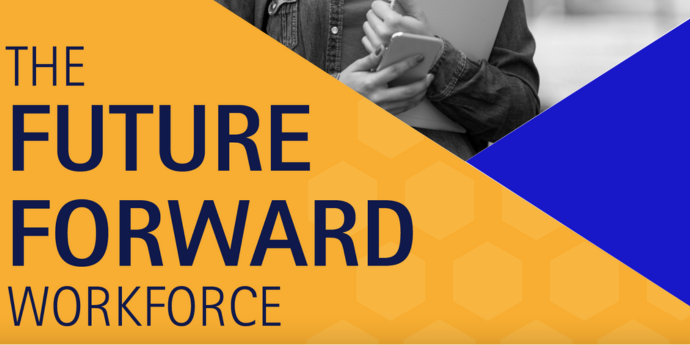Industry 4.0 is a fascinating, exhilarating and scary place. No-one is entirely sure where it is all going. It all sometimes feels a bit much. There are robots in the factories, AI in the boardroom, products and services that become irrelevant almost the moment they’re created, and loose-knit organisations wherein no-one and everyone is a manager at the same time. It’s difficult to see your place in that world isn’t it?
Four technologies will drive change over the next three or four years, according to the World Economic Forum’s 2018 Future of Jobs report: Ubiquitous high-speed mobile internet, artificial intelligence, the widespread adoption of big data analytics, and cloud technology. By 2022, the report shows, 85% of companies surveyed will have invested in big data analytics, Internet of Things and apps, and cloud computing. Across all sectors, up to 37% of respondents are planning to adopt robots.
In response to these changes, new business structures are emerging, driven by a need for flexibility and collaboration. An EY.com study titled Global Global Generations: A Global Study on Work-life Challenges Across Generations: A Global Study on Work-life Challenges Across Generations, found that 71% of respondents would leave “a work environment that does not encourage teamwork”, and 69% would leave because of a “boss who doesn’t allow you to work flexibly”. And with 75% of millennials taking up management positions in industry according to Deloitte Global 2018 Millennial Survey, new structures like the remote workforce and holacracies (where companies go without managers) are likely to become commonplace.
It is all very intriguing, but it would be very odd not to feel overwhelmed at the sheer magnitude of the shifts taking place. Even millennials and Gen-Zs are nervous. In the Deloitte Millennial Survey, 10,455 millennials and 1,844 Gen-Z took part, and both generations don’t feel ready for industry 4.0.
So where do you as middle management fit in? What skills will help you to stay relevant in this new environment?
Jenny Boxall is the course convenor of the oldest business short course in South Africa, the Programme for Management Development, which runs both in Cape Town and Johannesburg. She’s been helping future-proof businesses for years through developing the right sort of manager. She says that even if your role tomorrow is unrecognisable, there are five management mindsets based on Henry Mintzburg’s management model, that if mastered, will help make you an asset in any company of the future.
1. Managing Self
“Effective leadership starts with self-awareness,” says Boxall. “In a time of change, it is especially important to self-evaluate, to find out where your strengths and weaknesses lie.”
Are you a good communicator? Do you give clear goals and directives? Are you a good motivator? Are you confident? Are you aware of the shifts in your industry?
Part of self-reflection is seeking out blind spots. What assumptions are we constantly making about ourselves, about others, about the work and the industry, about technology, about the market, that have become hindrances to both personal and organisational growth?
2. Managing the Organisation
We’ve seen how organisations are going to change, from the physical buildings they inhabit to their very structures, from how work flows through them to the workforce being completely dispersed. Things are going to change, and you’re going to have to come to grips with two things: AI is going to take over part of your work, but it’s also going to free up time; time for you to hone your analytical and strategic awareness.
At present managers use 54% of their time on administration, and very little time on connecting with teams and strategising.
“By embracing AI, you’ll have more time to revitalise your teams, re-establish organisational goals and values, and navigate the changes in the industry. You will also be able to be more agile by harnessing big data,” says Boxall.
3. Managing Context
Beyond the organisation lies the rest of the world. In the workplace of the future, it will be more critical than ever for leaders and managers to be able to understand other people's circumstances, habits, and cultures. This can mean - literally - getting out of our offices and spending time where products are produced, customers served, and environments threatened.
It also means understanding how the world works.
“It’s important to move with the times, to understand the context in which you operate and will operate tomorrow,” she says. “Something as simple as grasping that the world has moved online.”
Look at the pizza industry in the US. It’s a simple product that’s 300 years old with simple business models: take away, sit-in, take n’ bake, and delivery. And there are 75,243 pizza shops in the US. They all try to compete on toppings, and atmosphere, on crust thicknesses, and baking techniques, but analysis has shown that those pizzerias with the highest web rankings, also have the highest sales. A simple win.
4. Managing Relationships
“In a world where everything is automated and we don’t actually have to show up to a physical office space, organisations will, paradoxically, thrive on human interaction,” says Boxall. “Those interactions and relationships will need to be nurtured, guided and harnessed. The skill relies on listening, understanding and respecting the needs of others.”
For example, the millennials in your organisation want a culture where people feel valued, independent and part of a team. The Gen-Zs want to see organisational goals that are more ethical and that reach further than profits to actually change the world in positive ways.
“These are the types of demands and needs that if heeded by a good manager, will help retain talent and drive motivation in the workplaces of tomorrow,” she says.
5. Managing Change
With all these changes, you could either roll up into a little ball and get chucked out like a VHS tape, or you could adapt, learn to learn continuously, and lead the change.
Boxall says the most effective manager of tomorrow will integrate all five mindsets in order to achieve this. They will be able to develop a sense of the terrain and guide everyone along that course. This means being able to blend collaboration, self-reflection and action while also being analytically worldly.
“It is no small ask,” she says, “but it is also not impossible to achieve.”
In this way, by the time an AI machine is sitting on the board of the company — as has been predicted — you will be comfortably across the table from them.
Kumeshnee West is the Executive Education Director at the UCT Graduate School of Business.







































